NURS 2022: Consent and Mandatory Reporting - A RN's Ethical Role
VerifiedAdded on 2023/06/09
|7
|1384
|445
Essay
AI Summary
This essay discusses the role of a Registered Nurse (RN) in the context of child healthcare, focusing on consent and mandatory reporting. It highlights the importance of evidence-based and person-centered care, emphasizing the therapeutic relationship between nurses, patients, and their families. The essay references the Nursing and Midwifery Board of Australia's practice standards, specifically addressing how these standards apply to obtaining consent from parents or guardians for medical procedures involving children under 18. It further explores the legal and ethical obligations of RNs regarding mandatory reporting of suspected child abuse, aligning this responsibility with the RN's duty to provide safe, appropriate, and responsive care according to prevailing policies and legislation. The essay concludes by emphasizing the need for positive relationships between healthcare professionals and caregivers to overcome barriers in reporting child abuse, ultimately promoting the optimal health and well-being of vulnerable children.
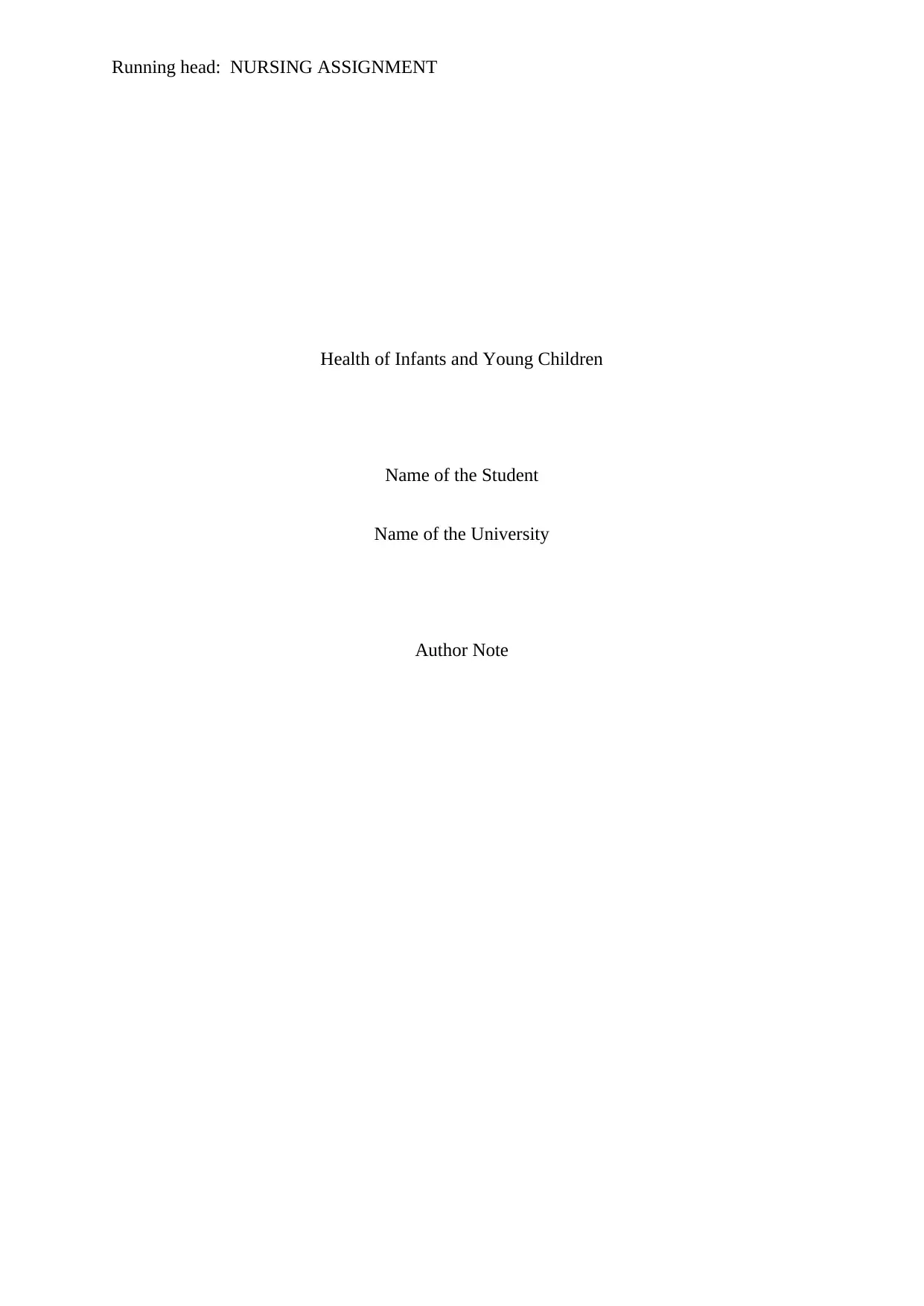
Running head: NURSING ASSIGNMENT
Health of Infants and Young Children
Name of the Student
Name of the University
Author Note
Health of Infants and Young Children
Name of the Student
Name of the University
Author Note
Paraphrase This Document
Need a fresh take? Get an instant paraphrase of this document with our AI Paraphraser
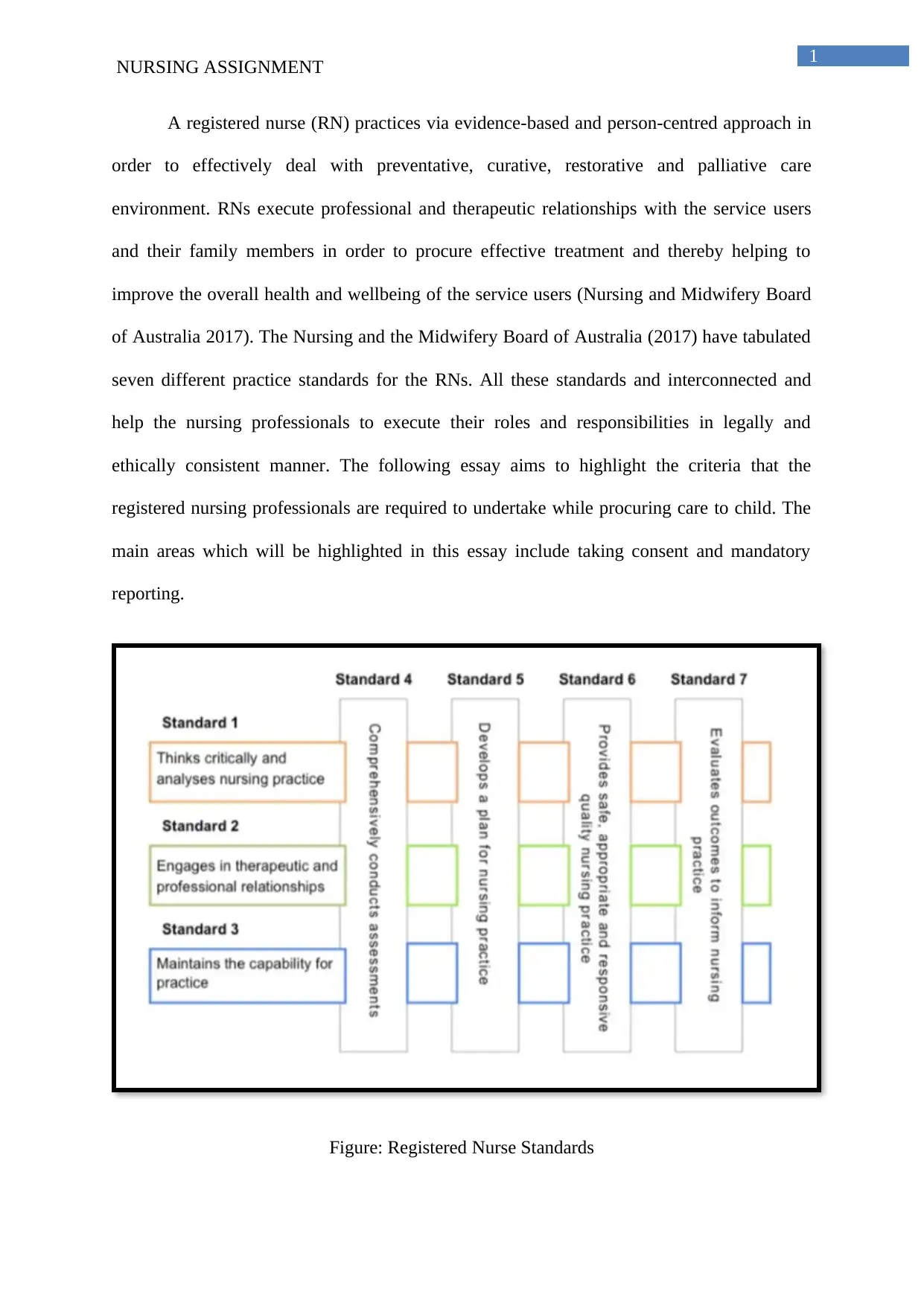
1
NURSING ASSIGNMENT
A registered nurse (RN) practices via evidence-based and person-centred approach in
order to effectively deal with preventative, curative, restorative and palliative care
environment. RNs execute professional and therapeutic relationships with the service users
and their family members in order to procure effective treatment and thereby helping to
improve the overall health and wellbeing of the service users (Nursing and Midwifery Board
of Australia 2017). The Nursing and the Midwifery Board of Australia (2017) have tabulated
seven different practice standards for the RNs. All these standards and interconnected and
help the nursing professionals to execute their roles and responsibilities in legally and
ethically consistent manner. The following essay aims to highlight the criteria that the
registered nursing professionals are required to undertake while procuring care to child. The
main areas which will be highlighted in this essay include taking consent and mandatory
reporting.
Figure: Registered Nurse Standards
NURSING ASSIGNMENT
A registered nurse (RN) practices via evidence-based and person-centred approach in
order to effectively deal with preventative, curative, restorative and palliative care
environment. RNs execute professional and therapeutic relationships with the service users
and their family members in order to procure effective treatment and thereby helping to
improve the overall health and wellbeing of the service users (Nursing and Midwifery Board
of Australia 2017). The Nursing and the Midwifery Board of Australia (2017) have tabulated
seven different practice standards for the RNs. All these standards and interconnected and
help the nursing professionals to execute their roles and responsibilities in legally and
ethically consistent manner. The following essay aims to highlight the criteria that the
registered nursing professionals are required to undertake while procuring care to child. The
main areas which will be highlighted in this essay include taking consent and mandatory
reporting.
Figure: Registered Nurse Standards
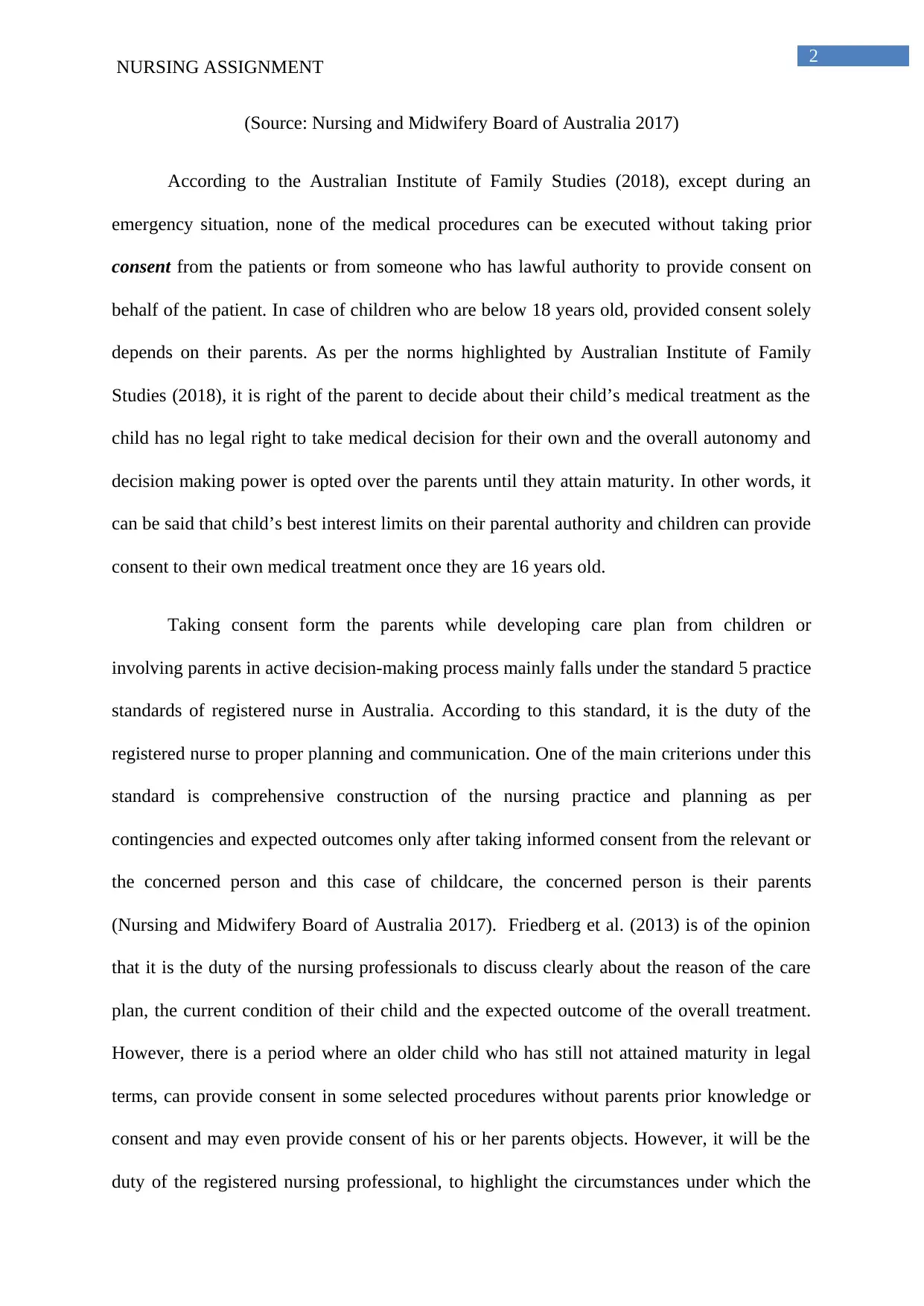
2
NURSING ASSIGNMENT
(Source: Nursing and Midwifery Board of Australia 2017)
According to the Australian Institute of Family Studies (2018), except during an
emergency situation, none of the medical procedures can be executed without taking prior
consent from the patients or from someone who has lawful authority to provide consent on
behalf of the patient. In case of children who are below 18 years old, provided consent solely
depends on their parents. As per the norms highlighted by Australian Institute of Family
Studies (2018), it is right of the parent to decide about their child’s medical treatment as the
child has no legal right to take medical decision for their own and the overall autonomy and
decision making power is opted over the parents until they attain maturity. In other words, it
can be said that child’s best interest limits on their parental authority and children can provide
consent to their own medical treatment once they are 16 years old.
Taking consent form the parents while developing care plan from children or
involving parents in active decision-making process mainly falls under the standard 5 practice
standards of registered nurse in Australia. According to this standard, it is the duty of the
registered nurse to proper planning and communication. One of the main criterions under this
standard is comprehensive construction of the nursing practice and planning as per
contingencies and expected outcomes only after taking informed consent from the relevant or
the concerned person and this case of childcare, the concerned person is their parents
(Nursing and Midwifery Board of Australia 2017). Friedberg et al. (2013) is of the opinion
that it is the duty of the nursing professionals to discuss clearly about the reason of the care
plan, the current condition of their child and the expected outcome of the overall treatment.
However, there is a period where an older child who has still not attained maturity in legal
terms, can provide consent in some selected procedures without parents prior knowledge or
consent and may even provide consent of his or her parents objects. However, it will be the
duty of the registered nursing professional, to highlight the circumstances under which the
NURSING ASSIGNMENT
(Source: Nursing and Midwifery Board of Australia 2017)
According to the Australian Institute of Family Studies (2018), except during an
emergency situation, none of the medical procedures can be executed without taking prior
consent from the patients or from someone who has lawful authority to provide consent on
behalf of the patient. In case of children who are below 18 years old, provided consent solely
depends on their parents. As per the norms highlighted by Australian Institute of Family
Studies (2018), it is right of the parent to decide about their child’s medical treatment as the
child has no legal right to take medical decision for their own and the overall autonomy and
decision making power is opted over the parents until they attain maturity. In other words, it
can be said that child’s best interest limits on their parental authority and children can provide
consent to their own medical treatment once they are 16 years old.
Taking consent form the parents while developing care plan from children or
involving parents in active decision-making process mainly falls under the standard 5 practice
standards of registered nurse in Australia. According to this standard, it is the duty of the
registered nurse to proper planning and communication. One of the main criterions under this
standard is comprehensive construction of the nursing practice and planning as per
contingencies and expected outcomes only after taking informed consent from the relevant or
the concerned person and this case of childcare, the concerned person is their parents
(Nursing and Midwifery Board of Australia 2017). Friedberg et al. (2013) is of the opinion
that it is the duty of the nursing professionals to discuss clearly about the reason of the care
plan, the current condition of their child and the expected outcome of the overall treatment.
However, there is a period where an older child who has still not attained maturity in legal
terms, can provide consent in some selected procedures without parents prior knowledge or
consent and may even provide consent of his or her parents objects. However, it will be the
duty of the registered nursing professional, to highlight the circumstances under which the
⊘ This is a preview!⊘
Do you want full access?
Subscribe today to unlock all pages.

Trusted by 1+ million students worldwide
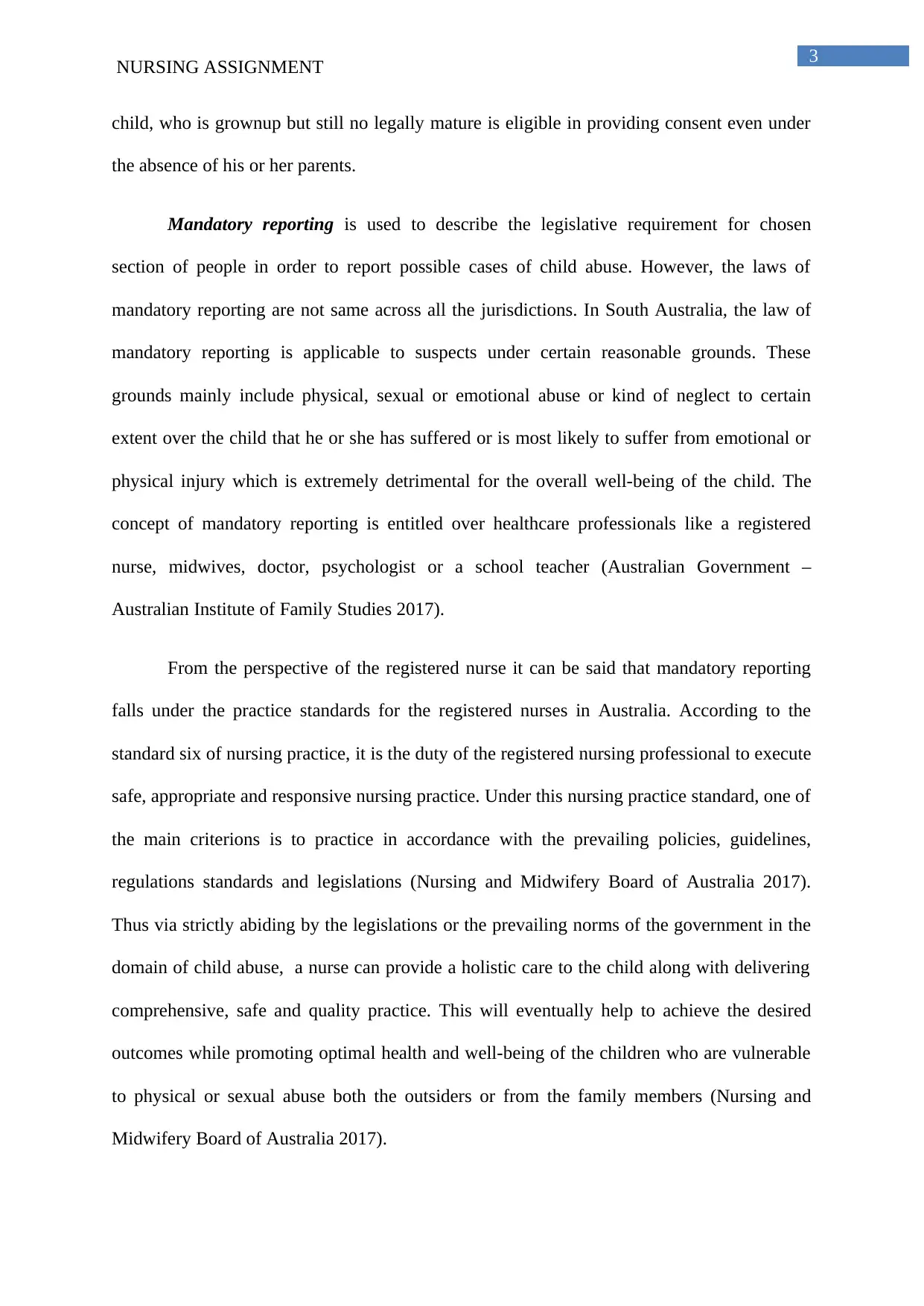
3
NURSING ASSIGNMENT
child, who is grownup but still no legally mature is eligible in providing consent even under
the absence of his or her parents.
Mandatory reporting is used to describe the legislative requirement for chosen
section of people in order to report possible cases of child abuse. However, the laws of
mandatory reporting are not same across all the jurisdictions. In South Australia, the law of
mandatory reporting is applicable to suspects under certain reasonable grounds. These
grounds mainly include physical, sexual or emotional abuse or kind of neglect to certain
extent over the child that he or she has suffered or is most likely to suffer from emotional or
physical injury which is extremely detrimental for the overall well-being of the child. The
concept of mandatory reporting is entitled over healthcare professionals like a registered
nurse, midwives, doctor, psychologist or a school teacher (Australian Government –
Australian Institute of Family Studies 2017).
From the perspective of the registered nurse it can be said that mandatory reporting
falls under the practice standards for the registered nurses in Australia. According to the
standard six of nursing practice, it is the duty of the registered nursing professional to execute
safe, appropriate and responsive nursing practice. Under this nursing practice standard, one of
the main criterions is to practice in accordance with the prevailing policies, guidelines,
regulations standards and legislations (Nursing and Midwifery Board of Australia 2017).
Thus via strictly abiding by the legislations or the prevailing norms of the government in the
domain of child abuse, a nurse can provide a holistic care to the child along with delivering
comprehensive, safe and quality practice. This will eventually help to achieve the desired
outcomes while promoting optimal health and well-being of the children who are vulnerable
to physical or sexual abuse both the outsiders or from the family members (Nursing and
Midwifery Board of Australia 2017).
NURSING ASSIGNMENT
child, who is grownup but still no legally mature is eligible in providing consent even under
the absence of his or her parents.
Mandatory reporting is used to describe the legislative requirement for chosen
section of people in order to report possible cases of child abuse. However, the laws of
mandatory reporting are not same across all the jurisdictions. In South Australia, the law of
mandatory reporting is applicable to suspects under certain reasonable grounds. These
grounds mainly include physical, sexual or emotional abuse or kind of neglect to certain
extent over the child that he or she has suffered or is most likely to suffer from emotional or
physical injury which is extremely detrimental for the overall well-being of the child. The
concept of mandatory reporting is entitled over healthcare professionals like a registered
nurse, midwives, doctor, psychologist or a school teacher (Australian Government –
Australian Institute of Family Studies 2017).
From the perspective of the registered nurse it can be said that mandatory reporting
falls under the practice standards for the registered nurses in Australia. According to the
standard six of nursing practice, it is the duty of the registered nursing professional to execute
safe, appropriate and responsive nursing practice. Under this nursing practice standard, one of
the main criterions is to practice in accordance with the prevailing policies, guidelines,
regulations standards and legislations (Nursing and Midwifery Board of Australia 2017).
Thus via strictly abiding by the legislations or the prevailing norms of the government in the
domain of child abuse, a nurse can provide a holistic care to the child along with delivering
comprehensive, safe and quality practice. This will eventually help to achieve the desired
outcomes while promoting optimal health and well-being of the children who are vulnerable
to physical or sexual abuse both the outsiders or from the family members (Nursing and
Midwifery Board of Australia 2017).
Paraphrase This Document
Need a fresh take? Get an instant paraphrase of this document with our AI Paraphraser
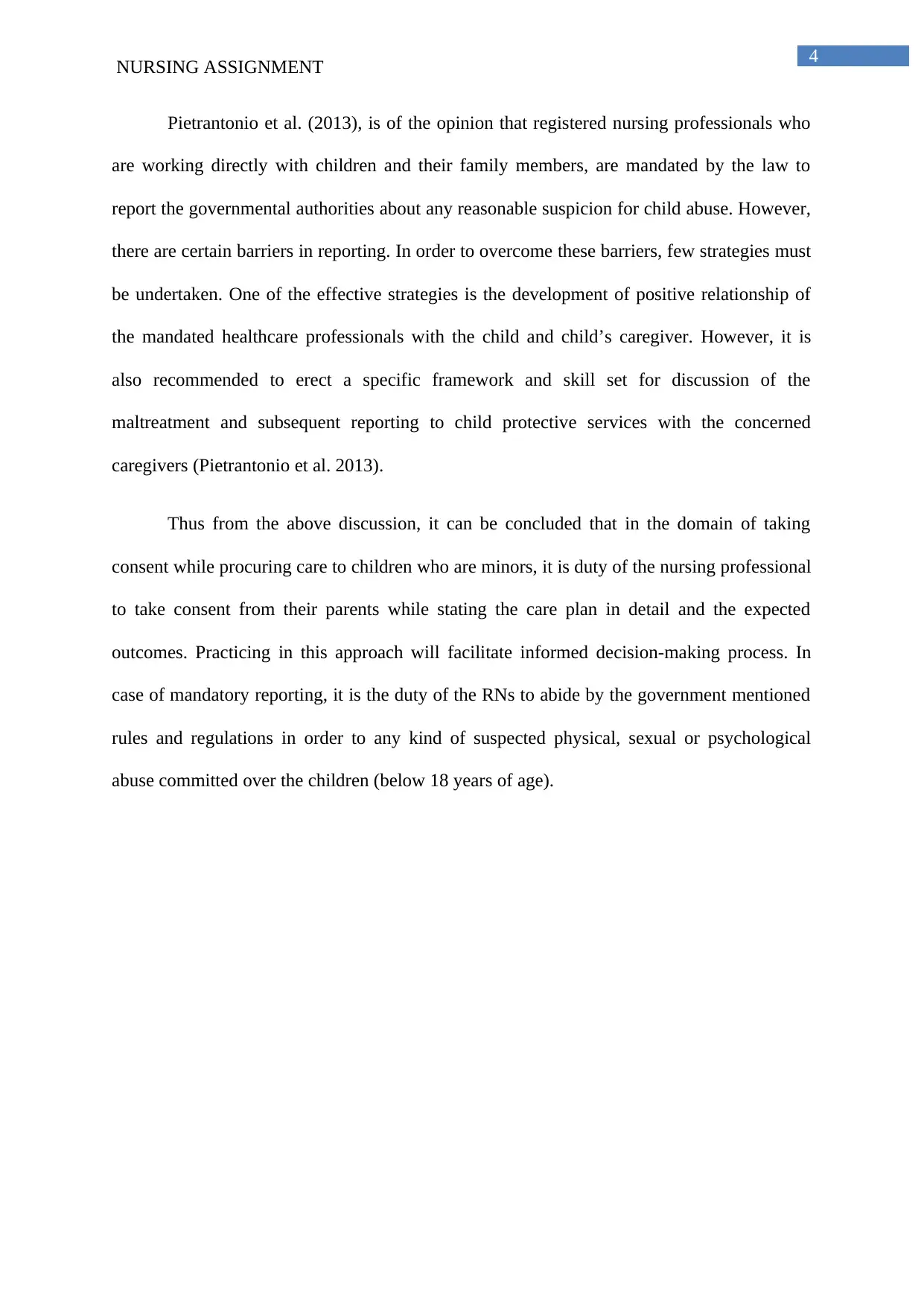
4
NURSING ASSIGNMENT
Pietrantonio et al. (2013), is of the opinion that registered nursing professionals who
are working directly with children and their family members, are mandated by the law to
report the governmental authorities about any reasonable suspicion for child abuse. However,
there are certain barriers in reporting. In order to overcome these barriers, few strategies must
be undertaken. One of the effective strategies is the development of positive relationship of
the mandated healthcare professionals with the child and child’s caregiver. However, it is
also recommended to erect a specific framework and skill set for discussion of the
maltreatment and subsequent reporting to child protective services with the concerned
caregivers (Pietrantonio et al. 2013).
Thus from the above discussion, it can be concluded that in the domain of taking
consent while procuring care to children who are minors, it is duty of the nursing professional
to take consent from their parents while stating the care plan in detail and the expected
outcomes. Practicing in this approach will facilitate informed decision-making process. In
case of mandatory reporting, it is the duty of the RNs to abide by the government mentioned
rules and regulations in order to any kind of suspected physical, sexual or psychological
abuse committed over the children (below 18 years of age).
NURSING ASSIGNMENT
Pietrantonio et al. (2013), is of the opinion that registered nursing professionals who
are working directly with children and their family members, are mandated by the law to
report the governmental authorities about any reasonable suspicion for child abuse. However,
there are certain barriers in reporting. In order to overcome these barriers, few strategies must
be undertaken. One of the effective strategies is the development of positive relationship of
the mandated healthcare professionals with the child and child’s caregiver. However, it is
also recommended to erect a specific framework and skill set for discussion of the
maltreatment and subsequent reporting to child protective services with the concerned
caregivers (Pietrantonio et al. 2013).
Thus from the above discussion, it can be concluded that in the domain of taking
consent while procuring care to children who are minors, it is duty of the nursing professional
to take consent from their parents while stating the care plan in detail and the expected
outcomes. Practicing in this approach will facilitate informed decision-making process. In
case of mandatory reporting, it is the duty of the RNs to abide by the government mentioned
rules and regulations in order to any kind of suspected physical, sexual or psychological
abuse committed over the children (below 18 years of age).
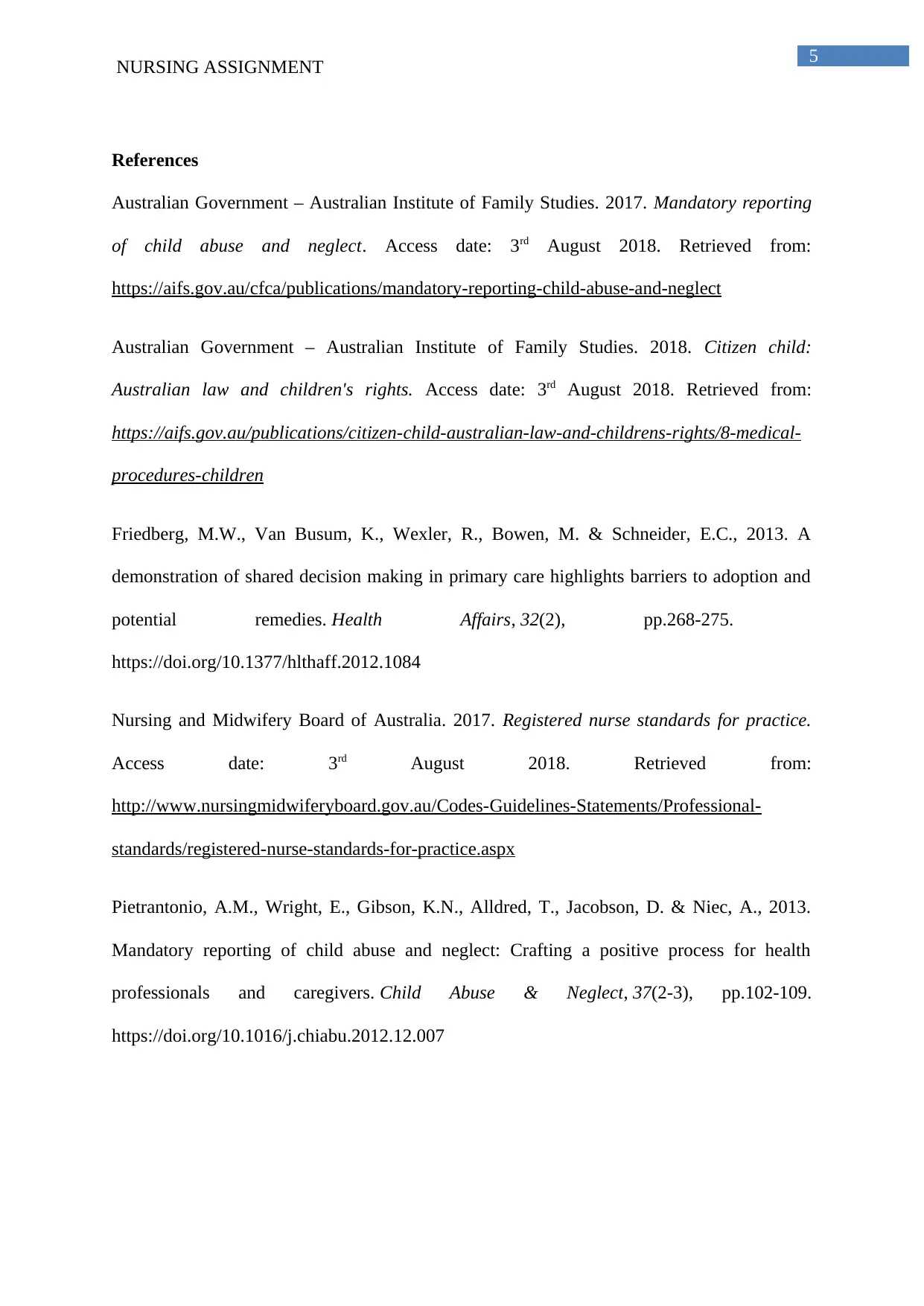
5
NURSING ASSIGNMENT
References
Australian Government – Australian Institute of Family Studies. 2017. Mandatory reporting
of child abuse and neglect. Access date: 3rd August 2018. Retrieved from:
https://aifs.gov.au/cfca/publications/mandatory-reporting-child-abuse-and-neglect
Australian Government – Australian Institute of Family Studies. 2018. Citizen child:
Australian law and children's rights. Access date: 3rd August 2018. Retrieved from:
https://aifs.gov.au/publications/citizen-child-australian-law-and-childrens-rights/8-medical-
procedures-children
Friedberg, M.W., Van Busum, K., Wexler, R., Bowen, M. & Schneider, E.C., 2013. A
demonstration of shared decision making in primary care highlights barriers to adoption and
potential remedies. Health Affairs, 32(2), pp.268-275.
https://doi.org/10.1377/hlthaff.2012.1084
Nursing and Midwifery Board of Australia. 2017. Registered nurse standards for practice.
Access date: 3rd August 2018. Retrieved from:
http://www.nursingmidwiferyboard.gov.au/Codes-Guidelines-Statements/Professional-
standards/registered-nurse-standards-for-practice.aspx
Pietrantonio, A.M., Wright, E., Gibson, K.N., Alldred, T., Jacobson, D. & Niec, A., 2013.
Mandatory reporting of child abuse and neglect: Crafting a positive process for health
professionals and caregivers. Child Abuse & Neglect, 37(2-3), pp.102-109.
https://doi.org/10.1016/j.chiabu.2012.12.007
NURSING ASSIGNMENT
References
Australian Government – Australian Institute of Family Studies. 2017. Mandatory reporting
of child abuse and neglect. Access date: 3rd August 2018. Retrieved from:
https://aifs.gov.au/cfca/publications/mandatory-reporting-child-abuse-and-neglect
Australian Government – Australian Institute of Family Studies. 2018. Citizen child:
Australian law and children's rights. Access date: 3rd August 2018. Retrieved from:
https://aifs.gov.au/publications/citizen-child-australian-law-and-childrens-rights/8-medical-
procedures-children
Friedberg, M.W., Van Busum, K., Wexler, R., Bowen, M. & Schneider, E.C., 2013. A
demonstration of shared decision making in primary care highlights barriers to adoption and
potential remedies. Health Affairs, 32(2), pp.268-275.
https://doi.org/10.1377/hlthaff.2012.1084
Nursing and Midwifery Board of Australia. 2017. Registered nurse standards for practice.
Access date: 3rd August 2018. Retrieved from:
http://www.nursingmidwiferyboard.gov.au/Codes-Guidelines-Statements/Professional-
standards/registered-nurse-standards-for-practice.aspx
Pietrantonio, A.M., Wright, E., Gibson, K.N., Alldred, T., Jacobson, D. & Niec, A., 2013.
Mandatory reporting of child abuse and neglect: Crafting a positive process for health
professionals and caregivers. Child Abuse & Neglect, 37(2-3), pp.102-109.
https://doi.org/10.1016/j.chiabu.2012.12.007
⊘ This is a preview!⊘
Do you want full access?
Subscribe today to unlock all pages.

Trusted by 1+ million students worldwide
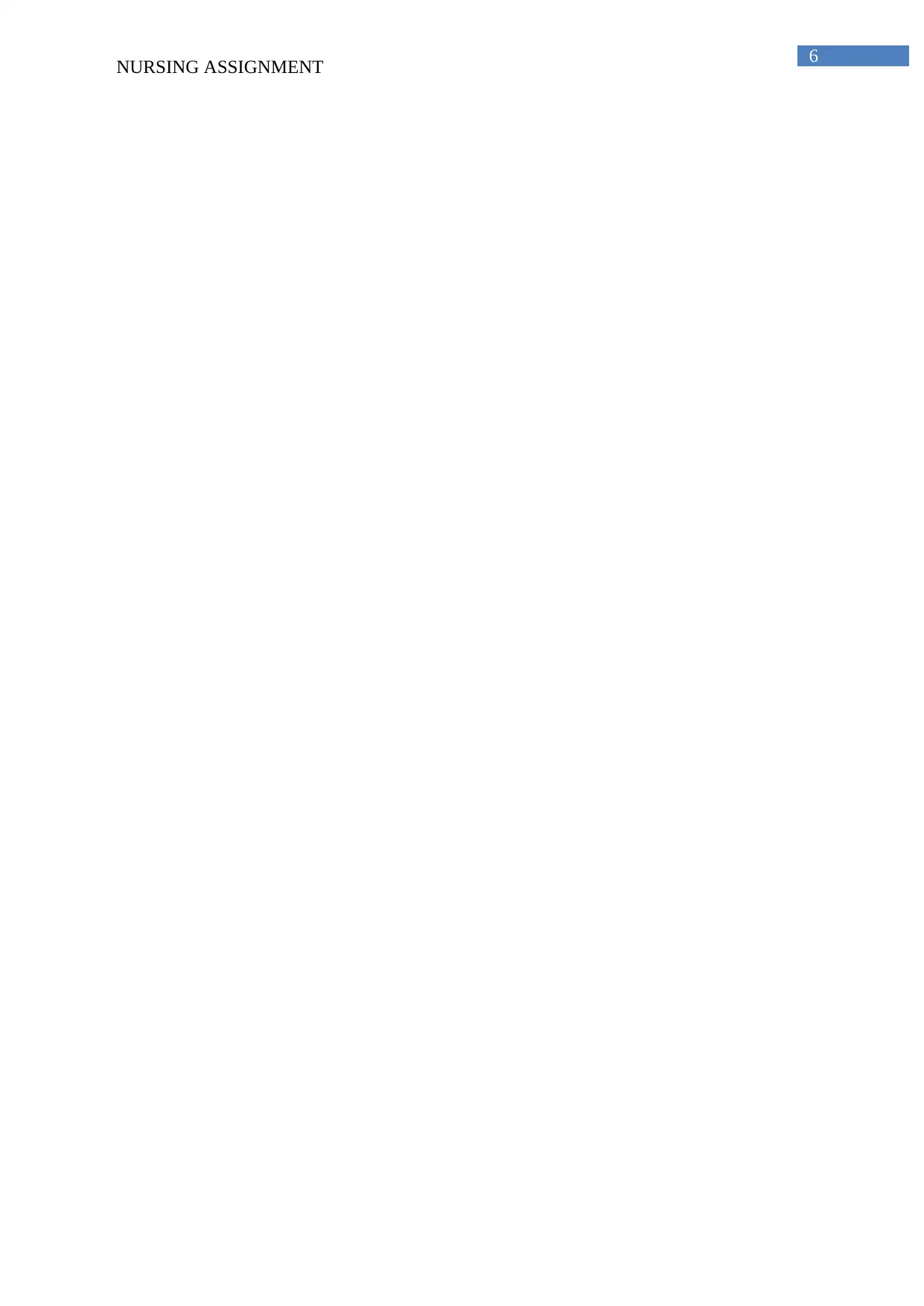
6
NURSING ASSIGNMENT
NURSING ASSIGNMENT
1 out of 7
Related Documents
Your All-in-One AI-Powered Toolkit for Academic Success.
+13062052269
info@desklib.com
Available 24*7 on WhatsApp / Email
![[object Object]](/_next/static/media/star-bottom.7253800d.svg)
Unlock your academic potential
Copyright © 2020–2026 A2Z Services. All Rights Reserved. Developed and managed by ZUCOL.





